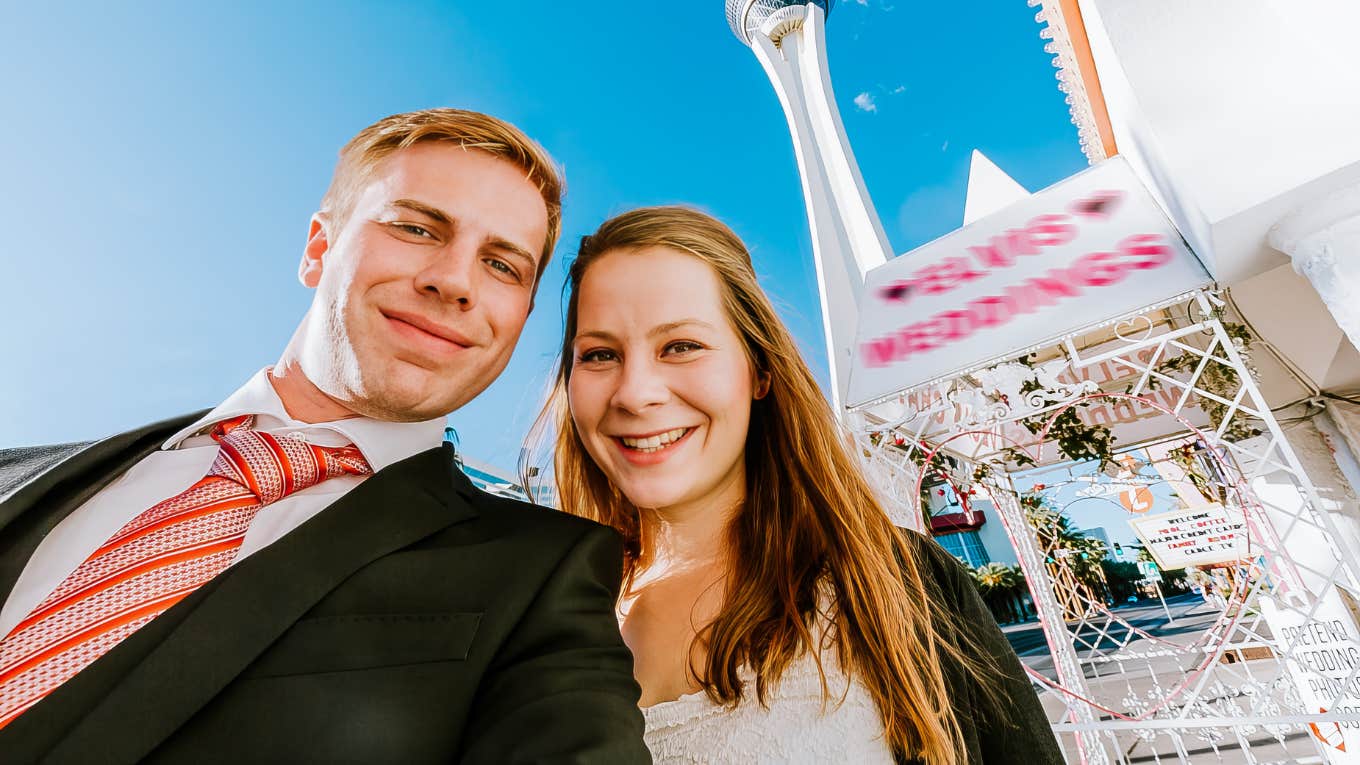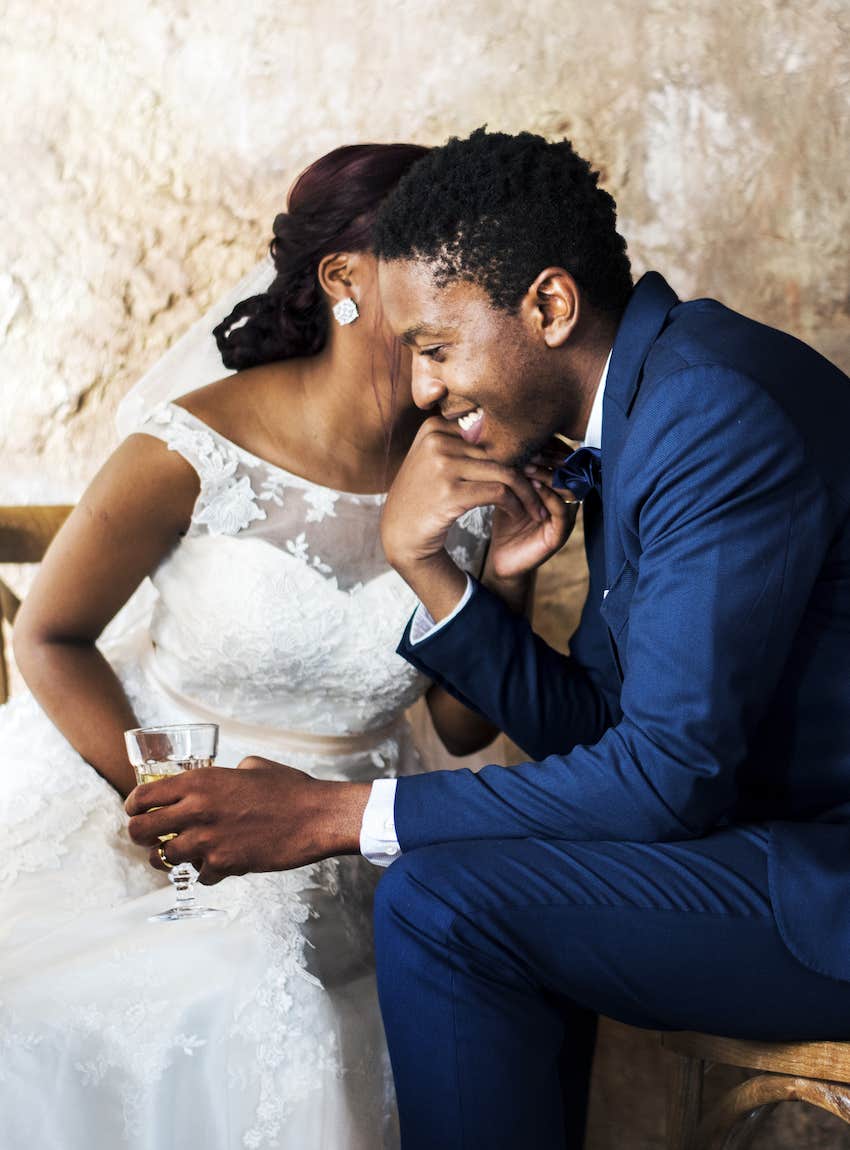Couples Who Avoid This Popular Event Have Much Happier Marriages, According To Research
Oddly enough, the event in question is specifically related to marriage.
 Oscity | Shutterstock
Oscity | Shutterstock Fancy white dress. Beautiful flowers. Ornate, tiered cake. And a handsome Prince Charming waiting at the end of the aisle declaring his eternal love to you before an adoring, teary-eyed crowd. Here comes the bride. She's just so beautiful and special! For generations, we've sold little girls this dream of a "fairytale wedding day" as the #1 romantic aspiration of "successful" womanhood.
Yet, for all of the "til death do us part" swooniness (and, as published in The Wedding Report, the $60 billion wedding industry that relentlessly perpetuates it), the national marital divorce according to the CDC dropped slightly to 41 percent.
And despite the promise that your "happily ever after" is waiting at the altar, it turns out it's couples who avoid big weddings that have happier marriages.
As shown by research from The American Sociological Association, women initiate two-thirds of divorces, 37 percent of them confessing they felt serious doubts on their wedding day about whether they were ready for the commitment or whether they were marrying the right person.
Why did they go through with their something borrowed-something blue "I do" then? Many women said they felt "significant external pressure" from parents, peers, their partners, or societal expectations. Or they believed they wouldn't find anyone else to marry.
In short, they thought it better to have the socially coveted status of being married, even unhappily, than not be married at all. Which begs the question — why do we keep selling our daughters this outdated fairytale?
For all the progress made for women in the world, why is a wedding still the only socially valued ritual our girls have to look forward to? Think about it.
- A wedding is the only time in a young woman's life when everyone she knows (plus one) happily shows up, even flying in from out of the country, for her "special day."
- A wedding is the one "life accomplishment" that friends and family willingly, collectively, and extravagantly invest their time and money towards.
- A wedding is the one occasion when we dress our daughters up beautifully and shower them publicly with gifts, advice, and attention.
 Rawpixel.com via Shutterstock
Rawpixel.com via Shutterstock
Is it any wonder a girl dreams of her wedding day her entire life?
So much so that when her inner voice warns that she's not ready for the lifetime commitment looming after the fancy ceremony ends, she often swallows that truth and proceeds anyway. She goes ahead with the plan just to have her one shot at experiencing that once-in-a-lifetime, all-about-me love, attention, and support for a day.
But if the fairytale traditional wedding ritual is not specifically contributing to our daughters' actual happiness in marriage (and the pressure to have a wedding even encourages some women to knowingly enter marriage unhappily), perhaps it's time we separate the two and create a new rite of passage that a young woman dreams about from girlhood. One that might better prepare her for relationship success down the road if she does, at some point, choose to marry.
What might a re-imagined wedding ceremony look like?
Well, not too far off from a standard wedding, actually, if that's the fairytale dream experience little girls truly pine for (though I'm not convinced it is). Only instead of our daughters' worth being celebrated for her (finally) being chosen and deemed worthy of love by someone else, the I've-been-dreaming-of-it-since-I-was-a-little-girl pivotal ritual in every young woman's life would become a ceremony where friends, family, and community gather to celebrate her public commitment to honor and cherish herself.
Instead of fathers "giving their daughters away" to another man to care for — imagine proud parents hugging their daughter and symbolically sending her out into the world, confident they've prepared her to stand on her own two feet.
Imagine if bridesmaids became a young woman's Soul Circle, serving as a core group of special friends who promise to serve as positive reflections of a young woman's light, strength, and beauty as she journeys forth into a world that is often discouraging and harsh. (And hey, forcing those gal pals to all dress in pricey, matching taffeta dresses is still optional if that's your thing.)
What if guests, instead of bearing witness to vows between a couple, gathered around a young woman to witness her public declaration of her commitment to remaining true to her values, to her goals, to her integrity, and to honoring herself? Imagine showering such a girl with gifts to help her begin her new life, whether that be a toaster for her new apartment or luggage for her internship abroad.
 Guitarfoto via Shutterstock
Guitarfoto via Shutterstock
Would such a wedding ceremony retain a measure of status?
Sure, the $50 billion wedding industry would have to find something new to occupy itself with, but if "I want the fanciest party of them all" is her objective, go for it: Pouffy dress, floral bouquets, 3-tiered cakes, bring it all on! Or, the woman of honor can wear some other special outfit that shows off her unique style and beauty. She can adorn the room with pesticide-free roses if she wants. And cater a buffet of sugar-free, gluten-free, and dairy-free culinary delights if that's important to her.
The point is the day is all about her. It is about giving our daughters a celebratory rite of passage where they feel infinitely seen, celebrated, and special while simultaneously honoring their journey to go forth to discover and become more of who they truly are.
A young woman who first spends time in the world committed to truly being herself is far better prepared to make healthy choices about eventually stepping into a committed partnership with someone else later.
Does that mean no wedding ceremonies ever?
No, of course not. If a couple mutually chooses to have some sort of wedding ceremony to share their commitment and love with the world, more power to them. But, it's worth pondering how marriages might be more successful if entered into with eyes wide open and with the pomp and pageantry of a traditional wedding ceremony stripped away.
How many couples would still choose to legally say "I do" if we, as a society, focused on the sweet yet serious commitment they make on the big day as opposed to their wedding theme colors?
If we let the romance and weight of that precious promise shift to something couples exchange privately and celebrate subtly, would our girls still rush into it? After all, it is the couple on their own who must uphold their vows long after the $80-per-plate guests go home.
Would marriage rates decrease? Quite likely. But with the average wedding costing $30,000 and the average divorce costing $15,000 - $20,000. I'm personally ALL for fewer marriages entered into prematurely or with uncertainty! Statistics from the CDC show that couples who wait until after the age of 25 to marry are 24 percent less likely to divorce, reduced even more by those who delay child-rearing, obtain a college education, and achieve a level of financial security and self-awareness before marriage.
Yes, couples who spend time figuring out who they are, take time to experience life, and learn to face the realities of standing on their own two feet are far better at approaching marriage with the maturity it requires, as explored by 2017 research.
So, if it is truly marital happiness and stability that we want for our daughters, perhaps the best way to support that outcome is to stop saving for her wedding and start using that money and effort to invest in her.
What do you think? Would young girls be better off having a new life milestone ritual to look forward to instead of a wedding being her one "big day"? Or is a wedding one of the can't-miss rituals of adulthood?
Cris Gladly is a writer, speaker, and connection strategist with a passion for positive human relationships. She writes locally about food, travel, and community; writes nationally about love, relationships, social change, and parenting; and is an independent global consultant helping integrity-centered brands and individuals powerfully transform the way they position themselves and build connections with others.

